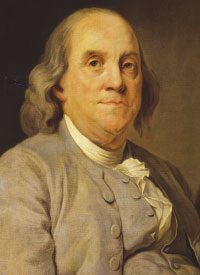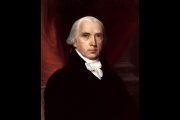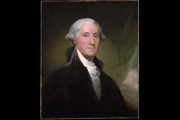
Often, for example, most of the most renowned and revered of the men of the founding generation are labeled “deists.” Deism was a theological philosophy popular in the 18th century, especially among the stratum of men associated with the Enlightenment. Stated simply, a deist believes in God, but considers Him an absent master, unconcerned with the quotidian comings and goings of His earthly creations.
Every one of the Founders listed in the following survey (with the possible exception of Benjamin Franklin) would reject such an appellation and in fact never referred to themselves as deists (again, with a passing reference to himself made by Franklin).
While the men mentioned herein held different interpretations of the characteristics of God, of His Son, Jesus Christ, and of the most correct way to worship them, they unanimously and sincerely believed that God was an all-powerful Creator and providentially interceded for mankind, particularly in the quest for liberty and the freedom of conscience that permitted diversity of worship.
Despite the claims of designing detractors furthering their own transparent agendas, none of our Founding Fathers abhorred religion. To the contrary, they embraced piety and encouraged others to do likewise.
As the following digest will demonstrate, however, the five men whose religious views are outlined below each fervently believed in a merciful Creator who took notice of the affairs of men and took, at times, a very active role in aiding the fight for American freedom.
Finally, the representatives included in this article were chosen for a specific purpose.
First, Benjamin Franklin and Thomas Jefferson are highlighted for their reputation (undeserved, mind you) of being the most impious of the Founders. On the other hand, John Adams is often described as being dogmatic and Puritanical, and for that reason he is also noted in this brief overview. As the father of his country, George Washington naturally merits attention in this article. Finally, James Madison is known to history as the Father of the Constitution and holds a place of special respect for his intellect, his famed adherence to the republican “middle way,” and his thoughtful and erudite defense of religious tolerance. For this reason, Madison is a member of this small sample of Founders.
We begin with the senior member of the class, Benjamin Franklin.
Benjamin Franklin was the most well-known American of his day. Although raised in the Calvinist environment of New England, young Benjamin was exposed at an early age to the writings of renowned English Whigs and deists, John Locke and Joseph Addison.
Franklin learned from these tutors that the principles of liberty were best promoted by personal piety and public virtue. He drank draught after draught from this cool, clear stream of thought and feasted freely from the cornucopia provided by these thoughtful promoters of freedom.
The more Franklin learned the lessons of the laws of nature and man’s place in the universe of ideas, he understood that not only was religion not an enemy of freedom, but was often its most ardent ally.
The famous Philadelphian witnessed many manifestations of the interest of Providence in the affairs of man. The stories of timely storms, favorable fogs, and other “acts of God” are well known to students of the American War for Independence. God, wrote Franklin, “sometimes interferes by His particular providence and sets aside the effects which would otherwise have been produced by … causes.” Hardly the words of a man who saw the Creator as a hands-off deity.
In that vein, moreover, there is the story retold by James Madison of Franklin’s heartfelt plea made at a critical moment of near-fatal impasse during the rancorous debates that had raged for over a month at the Constitutional Convention of 1787. Madison recorded that the following words were spoken by the Nestor of the Convention:
I have lived, Sir, a long time, and the longer I live, the more convincing proofs I see of this truth — that God Governs in the affairs of men. And if a sparrow cannot fall to the ground without his notice, is it probable that an empire can rise without his aid? We have been assured, Sir, in the sacred writings, that “except the Lord build the House they labour in vain that build it.” I firmly believe this; and I also believe that without his concurring aid we shall succeed in this political building no better, than the Builders of Babel.
The course of his life and the tenor of his written works reveal that tolerance of the faiths of others was the sine qua non of a godly man in Franklin’s estimation. As with many of the men of our founding generation, Benjamin Franklin fostered faithfulness and firmly believed that any creed that compelled man to live freely and love God and his fellow man was to be praised and promoted.
John Adams
John Adams was the son of a deacon, John Adams’ personality was shaped by the austere Puritanism of his infancy. Adams developed a deep reverence for God and an atavistic admiration for those good and holy Puritans who came before him.
Although certainly no deist, John Adams recognized the benefit to society from the practice of religions other than his own. Despite his reputation for austerity, Adams was no rock-ribbed Puritan unable to see the goodness in other creeds.
Like Franklin, Adams rejected the dogmatism of many of his fellows, preferring instead to follow a path of goodness to his fellowman and faithful obedience to revealed principles of righteousness.
One of the principles embraced wholeheartedly by Adams was freedom. In another point of similarity between himself and Dr. Franklin, Adams learned much of the foundational doctrines of freedom from the pages of the works of John Locke.
One author elegantly describes the effect of Locke’s philosophy on the mind of the pious Adams: “He [John Adams] seemed especially influenced by enlightened theists such as John Locke, who argued that reason applied to faith would enhance, not obliterate, Christianity.” Adams derived from his reading of Locke, and others of that vein, that revelation commingled with reason resulted in a substance that aided the spread of freedom and allowed its roots to more firmly fix themselves in the hearts and minds of man.
As with most of the other Founding Fathers, Adams’ approach to religion and the tolerance of its practice is often misstated by contemporary critics determined to deracinate the founding of this nation from the fertile soil of belief in the divine. For instance, there is this example provided by the recommendable book Founding Faith: Providence, Politics, and the Birth of Religious Freedom in America by Steven Waldman:
Those hoping to prove the irreligiousness of the Founders have no trouble finding ammunition from Adams. The liberal magazine The Nation and the website www.deism.org both homed in on this comment from Adams: “Twenty times in the course of my late reading, have I been upon the point of breaking out, ‘this would be the best of all possible worlds, if there were no religion in it.’” But in typical culture war behavior, neither The Nation nor deism.org included the rest of the quote, in which Adams explained that the negative sentiment soon passed and was replaced by his realization, “Without religion this world would be something not fit to be mentioned in polite society, I mean hell.”
This undisguised discrimination disregards the undeniable and ever-present truth that our Founding Fathers may have held distinct notions of God and espoused different doctrines, but to a man they knew and wrote that the freedom enjoyed by our nation would be jeopardized by any diminution of morality.
Witness this famous quote from John Adams himself: “Our Constitution was made only for a moral and religious people. It is wholly inadequate to the government of any other.”
George Washington
The Father of Our Country was a man of unparalleled respect and veneration among the giants of his age. He was, as Henry Lee said of him in his eulogy: “First in war, first in peace, and first in the hearts of his countrymen.”
Washington’s preeminence has attracted the devotion of many sectarians. Believers of every stripe seek for evidence in the writings and actions of the first President that he was one of their own. The exact boundaries of Washington’s personal beliefs are difficult to define, although his piety and belief in the protection of God afforded the faithful is beyond debate.
George Washington was a spiritual man who recognized the paternal protection of God in not only his own life, but in the life of the country he was fighting to free from tyranny. His own witness of the many miracles that thwarted the victory of Great Britain over the often ill-equipped army he was leading likely inspired the following words he wrote in a letter to General Thomas Nelson in 1778: “The Hand of providence has been so conspicuous in all this, that he must be worse than an infidel that lacks faith, and more than wicked, that has not gratitude enough to acknowledge his obligations.”
From his hope that the men under his command would become “good Christian soldiers,” to his recommendation to a group of Indian chiefs that they would benefit from following “the religion of Jesus Christ,” Washington acknowledged the critical role that faith in Christ played in the development of a sound and virtuous character.
In addition to the position of faith in God as the most important ingredient in the recipe for a good person, Washington also believed that religion was equally necessary in the creation of a good government.
In his Farewell Address, the former commanding general of the Continental Army and first President of the new Republic he helped create, proclaimed to his fellow citizens:
And let us with caution indulge the supposition that morality can be maintained without religion. Whatever may be conceded to the influence of refined education on minds of peculiar structure, reason and experience both forbid us to expect that national morality can prevail in exclusion of religious principle.
Finally, as in so many other areas, Washington was a leader of men and an exemplar to those around him when it came to tolerance of ideas and doctrines different to his own.
In a statement that predated the call of the Statue of Liberty to the “huddled masses,” George Washington proclaimed in an address to Irish immigrants:
The bosom of America is open to receive not only the Opulent and respectable Stranger, but the oppressed and persecuted of all Nations And Religions; whom we shall welcome to a participation of all our rights and privileges, if by decency and propriety of conduct they appear to merit the enjoyment.
In the most obvious display of his ability to look past the doctrinal distinctions among the adherents of various faiths, Washington united those of many religious groups into one army of Americans.
In a letter to General Benedict Arnold regarding the treatment of Catholics in Canada during the American army’s expedition there, General Washington instructed:
While we are contending for our own Liberty, we should be very cautious of violating the Rights of Conscience in others, ever considering that God alone is the Judge of the Hearts of Men, and to him only in this Case, they are answerable.
In one example after another, we see, Washington joined with Adams, Franklin, and others in setting the foundations of this Republic upon cornerstones of morality — public and personal. The nuances of this devotion, however, were to be decided by the declarant himself. Society was helped by the practice of religion and was harmed by its absence from the hearts of a free people.
Thomas Jefferson
Among those occupying positions in the pantheon of our Founding Fathers, perhaps none is more often portrayed as a denouncer of organized religion than Thomas Jefferson. As an avowed child of the Enlightenment, Jefferson certainly wrote “reason” with a capital R. He eschewed dogmatism and espoused liberality of thought. The rain of Reason seeped deeply into the groundwater of Jefferson’s mind and the evidence is seen in the Declaration of Independence and the obvious influence of John Locke, the aforementioned devotee of deism.
Jefferson undeniably believed in a Creator, although not necessarily one compatible in all points with the God of Christianity. That said, Jefferson repeatedly wrote in letters to friends and family of his deeply held belief that the pure doctrines preached by Jesus Christ were commendable in every instance.
In a letter to his friend Benjamin Rush, then-President Jefferson clarified his position on Christ and the religion He established:
To the corruption of Christianity I am, indeed, opposed, but not to the genuine precepts of Jesus himself. I am a Christian in the only sense in which I believe Jesus wished any one to be; sincerely attached to his doctrines, in preference to all others.
Jefferson’s personal religious practices consisted of regular Sabbath worship, as well as prayer. He could not, however, be considered a member of any one church or congregation. He chose to worship God by loving his neighbor, following the precepts of Jesus, and tolerating those with whom he disagreed in these matters.
Like Washington, and certainly out of character with the deist label that has been affixed to his theology, Jefferson recognized that in the founding of America, God was not an absent master. In his second inaugural address, Jefferson acknowledged the participation of God in the establishment of the young Republic:
I shall need, too, the favor of that Being in whose hands we are, who led our fathers, as Israel of old, from their native land and planted them in a country flowing with all the necessities and comforts of life.
As President, as penman of the Declaration of Independence, and as the Sage of Monticello, Thomas Jefferson revered the teachings of Jesus Christ and recommended to others the rightness of adherence to the same. He was a witness, along with his fellow founders, of the Hand of Providence in the founding of America and its restoration of freedom from the oppression of monarchs. He followed the path revealed to his mind by the precepts of Reason and granted to all men the unbridled right to do likewise without the interference of government.
James Madison
Raised in a religious household, James Madison was taught the doctrines of the Anglican church from birth. His father was a lay leader of the local congregation in Orange County, Virginia, and guided his family in the paths of righteousness as he understood them.
Madison biographer Ralph Ketcham described the influence of religion on the young James Madison in the following quote from his invaluable one-volume biography of the Father of the Constitution: “It is not possible to understand the purpose and earnestness of Madison’s public life without sensing its connection with the Christian atmosphere in which he was raised.”
Long ago scholars identified the arches and loops of John Locke’s fingerprints on the writings of James Madison. Evidence of this influence is often noted in Madison’s espousal of Lockean liberalism in the arguments set forth in The Federalist, particularly The Federalist, No. 51. That Madison benefited from Locke’s analysis of the machine of government and its relationship to the virtue of a people is indisputable, but to describe all Madison-ian philosophy as some sort of diluted mimicry of Lockean principles is lazy and incorrect.
Madison both borrowed from and disagreed with Locke’s opinion written nearly 100 years earlier.
Underlying the works of both men is the understanding that man is a creature of dual nature: He is a curious admixture of elements both spiritual and temporal. As Locke succinctly stated: “But besides their souls which are immortal, men have also their temporal lives here upon the earth.” Man’s dual nature demands dual allegiances, one to a religious authority and another to a civil authority. Man’s duty of loyalty to God animates his observations of obedience to ecclesiastical law, while his duty of loyalty to a civil magistrate proscribes any behavior contrary to the public weal.
Regarding the proper role of government in religion, Madison wrote, “The preservation of a free government requires not merely, that the metes and bounds which separate each department of power be invariably maintained; but more especially that neither of them be suffered to overleap the great barrier which defends the right of the people.”
As with the other men of the founding generation mentioned in this article, Madison believed that in society all men entered on equal conditions and retained an equal right to worship according to their own consciences. “While we assert for ourselves a freedom to embrace, to profess and to observe the Religion which we believe to be of divine origin, we cannot deny an equal freedom to those whose minds have not yet yielded to the evidence which has convinced us,” Madison averred.
Madison was inarguably Christian, but he was as certainly a proponent of the toleration of the peaceful religions of all men, regardless of their theology. In his “Memorial and Remonstrance,” Madison declared that freedom is found in the resistance to government meddling in the matters of personal devotion to deity.
Morality and Freedom
Despite their various personal dogmas, our Founding Fathers universally recognized the benefit to society of a citizenry that was moral and committed to genuinely conform their behavior to the constraints of their convictions. None of them was particularly evangelical, though all expressed a personal devotion to the teachings of Jesus Christ. Whether Puritan, Anglican, Presbyterian, or otherwise, the men who crafted our Constitution zealously protected the right of all men to worship as they pleased.
And in matters of good government, our noble forebears agreed that the purpose thereof was justice and the preservation of that liberty that was unique to our Republic. This end was most ably accomplished by recognizing that every one of the unalienable rights they fought so diligently to protect were given to man by God.
This article is an example of the exclusive content that’s available only by subscribing to our print magazine. Twice a month get in-depth features covering the political gamut: education, candidate profiles, immigration, healthcare, foreign policy, guns, etc. Digital options available! For more information, click here.



